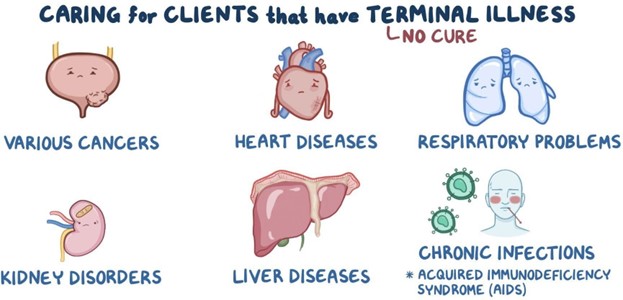A woman at 12 weeks' gestation comes to the clinic for her first prenatal visit.
After completing a health history, the nurse should discuss which topic about pregnancy at this initial visit?
Concerns about parenting.
Cultural practices related to childbearing.
Complications associated with childbirth.
Knowledge about labor and delivery.
The Correct Answer is D
Choice A rationale:
Concerns about parenting. While concerns about parenting are important to address during prenatal care, the initial visit focuses on gathering essential information and providing education related to pregnancy and childbirth. Knowledge about labor and delivery is crucial for the client to understand the process and make informed decisions.
Choice B rationale:
Cultural practices related to childbearing. Cultural practices related to childbearing are also essential topics to discuss during prenatal care, but they may not be the highest priority at the initial visit. Understanding the client's cultural background and beliefs is important, but providing information about pregnancy and childbirth should take precedence during the first prenatal visit.
Choice C rationale:
Complications associated with childbirth. Discussing complications associated with childbirth is important, but it may be overwhelming for a client during the initial prenatal visit. The primary focus should be on providing basic information and addressing immediate questions and concerns, with more in-depth discussions about complications occurring in subsequent visits.
Choice D rationale:
Knowledge about labor and delivery. This is the correct choice because the initial prenatal visit should include education about pregnancy, labor, and delivery. Providing the client with essential knowledge about what to expect during labor and delivery empowers her to make informed decisions and plan for her childbirth experience.
Nursing Test Bank
Naxlex Comprehensive Predictor Exams
Related Questions
Correct Answer is A
Explanation
The correct answer and explanation is:
a) Health care proxy documentation.
This is the information that the PN should collect during the admission assessment of a terminally ill client to an acute care facility. Health care proxy documentation is a legal document that appoints a person to make health care decisions for the client when they are unable to do so themselves. It is important to have this information in case the client's condition deteriorates and they need end-of-life care.
b) Name of funeral home to contact.
This is not the information that the PN should collect during the admission assessment of a terminally ill client to an acute care facility. Name of funeral home to contact is a personal preference that may or may not be relevant for the client at this point. It is not a priority for the admission assessment, and it may be insensitive or inappropriate to ask the client about it.
c) Client's wishes regarding organ donation.
This is not the information that the PN should collect during the admission assessment of a terminally ill client to an acute care facility. Client's wishes regarding organ donation are a personal choice that may or may not be applicable for the client depending on their diagnosis, prognosis, and eligibility. It is not a priority for the admission assessment, and it may be offensive or upsetting to ask the client about it.
d) Contact information for the client's next of kin.
This is not the information that the PN should collect during the admission assessment of a terminally ill client to an acute care facility. Contact information for the client's next of kin is a general demographic data that may or may not be relevant for the client's care. It is not a priority for the admission assessment, and it may be already available in the client's records.
 |
Correct Answer is C
Explanation
Choice A rationale:
Review the client's serum calcium level. Rationale: Checking the client's serum calcium level is not the most appropriate action in this situation. Hand and finger spasms during blood pressure measurement are more likely due to discomfort or muscle tension than a calcium deficiency. There is no immediate indication that the client's calcium level needs to be assessed urgently.
Choice B rationale:
Administer an as-needed (PRN) antianxiety medication. Rationale: Administering an antianxiety medication is not indicated in this situation. The client's symptoms of hand and finger spasms during blood pressure measurement are not likely related to anxiety. It is essential to address the immediate issue of obtaining an accurate blood pressure reading.
Choice C rationale:
Ask the UAP to take the blood pressure in the other arm. Rationale: This is the correct answer. When the UAP reports spasms in the client's right hand and fingers while taking blood pressure using the same arm, the nurse should prioritize obtaining an accurate blood pressure measurement. Asking the UAP to use the other arm can help ensure a more reliable reading. Muscle spasms in the arm being used for blood pressure measurement can lead to inaccurate results.
Choice D rationale:
Tell the UAP to use a different sphygmomanometer. Rationale: In this scenario, the issue appears to be related to muscle spasms in the client's hand and fingers rather than the sphygmomanometer itself. Changing the sphygmomanometer is unlikely to resolve the problem. The priority is to obtain an accurate blood pressure reading by addressing the spasms in the arm being used.
Whether you are a student looking to ace your exams or a practicing nurse seeking to enhance your expertise , our nursing education contents will empower you with the confidence and competence to make a difference in the lives of patients and become a respected leader in the healthcare field.
Visit Naxlex, invest in your future and unlock endless possibilities with our unparalleled nursing education contents today
Report Wrong Answer on the Current Question
Do you disagree with the answer? If yes, what is your expected answer? Explain.
Kindly be descriptive with the issue you are facing.
